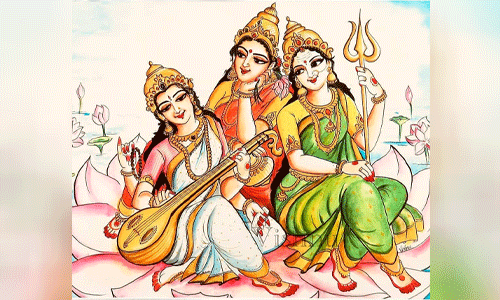One might need to inquire, which Women’s Day are we celebrating?
 The diverse psychology of different women alters the entire understanding of what Women’s Day represents. Various perspectives, including woke, liberal, ultra-feminist, center-right, and traditional, contribute to this understanding.
The diverse psychology of different women alters the entire understanding of what Women’s Day represents. Various perspectives, including woke, liberal, ultra-feminist, center-right, and traditional, contribute to this understanding.
As followers of the Dharma tradition, our adherence to what the Dharma Shastras have written serves as the litmus test.
The Vishnu Purana mentions the original Sri Lakshmi Devi, who is considered equal to her consort, Sriman Narayana, in her kindness and blessings:
“Sri, loyal to Vishnu, is the mother of the world. Vishnu represents meaning, while Sri embodies speech. She epitomizes conduct, while he exemplifies behavior. Vishnu is the knowledge, she the insight. He is dharma, she the virtuous action. She is the earth, he the earth’s upholder. She is contentment, he the satisfaction. She wishes, he is the desire. Sri is the sky, Vishnu is the Self of everything. He is the Sun, she the light of the Sun. He is the ocean, while she is the shore.”
It’s profound and integrated. Shakti and Shaktiman are not differentiated.
The most misunderstood Maharishi Manu states in Manusmriti (2.145):
“the rank of one acharya (Principal) is equal to that of 10 ordinary teachers, the rank of one father is equal to that of 100 acharyas, and the rank of one mother is equal to that of 1000 fathers.”
Why is there such eulogy of women by someone supposedly known for slandering them?
Just because a learned mother instills education in her children as their first Guru. These teachings from the mother penetrate deep into the child’s mind, shaping their attitudes and values in later years. Therefore, Mother Kunti in the Mahabharata, while asking Sri Krishna to convey her message to Yudhishthira, highlighted the distinct role of a mother or a woman.
She is “Dhatri” because she holds the baby in the womb, she is “Janani” because she gives birth and avoids aborting, she is “Amba” because she nourishes her child from all aspects of life. She is “Virasi” because she makes her child valorous, ensuring that the grown-up son or daughter has the courage to face the world.
Manusmriti (3.53) also declares ‘𝙔𝙖𝙩𝙧𝙖 𝙣𝙖𝙧𝙮𝙖𝙨𝙩𝙪 𝙥𝙪𝙟𝙮𝙖𝙣𝙩𝙚𝙮 𝙧𝙖𝙢𝙖𝙣𝙩𝙚𝙮 𝙩𝙖𝙩𝙧𝙖 𝙙𝙚𝙫𝙖𝙩𝙖’, i.e, “Wherever women are honored, there is heaven (abode of Gods), and where they are not, all activities fail.”
Mahabharata says, “There is no friend like the wife, there is no refuge better than the wife. There is no better ally in the world than the wife in acts undertaken for the acquisition of dharmic merit” (𝘔𝘢𝘩𝘢𝘣𝘩𝘢𝘳𝘢𝘵𝘢, 𝘚𝘩𝘢𝘯𝘵𝘪 𝘗𝘢𝘳𝘷𝘢 144.16).
The list and references are limitless, but the sastras also warn about different kinds of women whom one should avoid trusting and sharing confidentiality with. It seems like the great Rishis were referring to personalities with defects similar to those of the woke and ultra-feminist ideologies.
Conversely, how is it possible to respect women like Shurpanakha, and how easy is it to bow down to Mandodari and Tara?
Kaikeyi gave birth to a great son but invokes anger among Sri Rama’s followers, whereas Sumitra, the great lady and mother of Lakshmana and Shatrughna, is a fascinating character.
The killer of babies, Putana, does not represent the kind of woman one would want to honor on Women’s Day. However, personalities like Kunti, Draupadi, Tara, and Sita are praised and worshipped beyond just Women’s Day.
If we look at modern times, there are hundreds of women who deserve not only attention but also honor and respect, such as Jhansi ki Rani, Jijabai, Ahalya Bai, and many more up to now and hereafter.
There are many infamous women whom even women would curse for their heinous actions. However, there are also women whose profound influence and virtues transcend time. Therefore, it’s pertinent to reflect on and choose the type of Women’s Day celebration one wants to be a part of.
The word “stri” means to expand. What does she expand? Relationships and communities. She is “putri,” which means deliverer. She is called “Jyoti,” which means light, but if she is bereft of good qualities, she can be fire which burns down everything.
Therefore, when women or Bhakti, Shraddha, Pusti, Tusti and Medha are added to dharma, they give rise to boundless auspiciousness. Without dharma, it can lead to blindness, arrogance, and, of course, disruptive elements like ultra-feminism and woke movements.
On Women’s Day, we contemplate the divine essence epitomized by Parvati, Saraswati and Lakshmi, whose grace and wisdom illuminate our path, encouraging us to thrive and craft a cultural legacy that resonates for generations to come.
– Govinda Das


